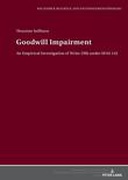Explore

In 2001, goodwill amortization in the US was eliminated in favor of an impairment-only approach, which, according to critics, gives managers vast discretion and opportunities for earnings management. Prior research suggests that discretionary asset write-offs are associated with economic factors and managers’ financial reporting objectives. Based on a systematic literature review, this study investigates for a comprehensive sample of US firms the determinants of goodwill write-off behavior. Regression analysis shows that write-off behavior is significantly explained by firms’ economic properties. Only in large, high-profile firms, incentives appear to be significant determinants. These findings suggest that the impairment-only approach does capture goodwill impairment at least to some extent.
This book is included in DOAB.
Why read this book? Have your say.
You must be logged in to comment.
Rights Information
Are you the author or publisher of this work? If so, you can claim it as yours by registering as an Unglue.it rights holder.Downloads
This work has been downloaded 262 times via unglue.it ebook links.
- 191 - pdf (CC BY) at OAPEN Library.
Keywords
- Accounting
- Accounting: study & revision guides
- Accountiung
- Bilanzpolitik
- Budgeting & financial management
- Business & management
- Economics, finance, business & management
- Empirical
- Finance & accounting
- Firmenwert
- Generally Accepted Accounting Principles
- Geschäftswert
- Goodwill
- Goodwill (Commerce)
- Impairment
- Investigation
- Management & management techniques
- Management of specific areas
- Offs
- Sellhorn
- SFAS
- thema EDItEUR::K Economics, Finance, Business and Management::KF Finance and accounting::KFC Accounting::KFCX Accounting: study and revision guides
- under
- US-GAAP
- USA
- Wertberichtigung
- Write
- Write-offs
Links
DOI: 10.3726/b14014Editions

